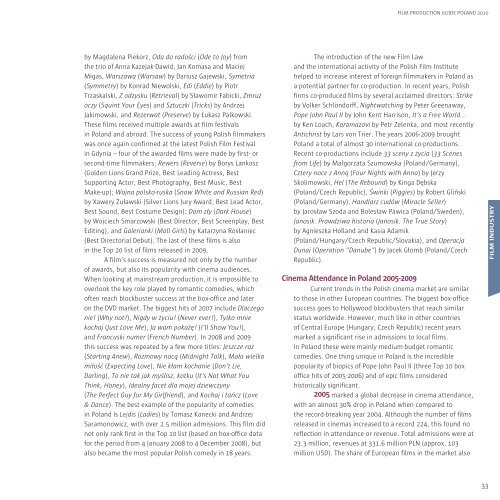Polish Cinema today - Polski Instytut Sztuki Filmowej
Polish Cinema today - Polski Instytut Sztuki Filmowej
Polish Cinema today - Polski Instytut Sztuki Filmowej
You also want an ePaper? Increase the reach of your titles
YUMPU automatically turns print PDFs into web optimized ePapers that Google loves.
y Magdalena Piekorz, Oda do radości (Ode to Joy) from<br />
the trio of Anna Kazejak-Dawid, Jan Komasa and Maciej<br />
Migas, Warszawa (Warsaw) by Dariusz Gajewski, Symetria<br />
(Symmetry) by Konrad Niewolski, Edi (Eddie) by Piotr<br />
Trzaskalski, Z odzysku (Retrieval) by Sławomir Fabicki, Zmruż<br />
oczy (Squint Your Eyes) and Sztuczki (Tricks) by Andrzej<br />
Jakimowski, and Rezerwat (Preserve) by Łukasz Palkowski.<br />
These films received multiple awards at film festivals<br />
in Poland and abroad. The success of young <strong>Polish</strong> filmmakers<br />
was once again confirmed at the latest <strong>Polish</strong> Film Festival<br />
in Gdynia – four of the awarded films were made by first- or<br />
second-time filmmakers: Rewers (Reverse) by Borys Lankosz<br />
(Golden Lions Grand Prize, Best Leading Actress, Best<br />
Supporting Actor, Best Photography, Best Music, Best<br />
Make-up); Wojna polsko-ruska (Snow White and Russian Red)<br />
by Xawery Żuławski (Silver Lions Jury Award, Best Lead Actor,<br />
Best Sound, Best Costume Design); Dom zły (Dark House)<br />
by Wojciech Smarzowski (Best Director, Best Screenplay, Best<br />
Editing), and Galerianki (Mall Girls) by Katarzyna Rosłaniec<br />
(Best Directorial Debut). The last of these films is also<br />
in the Top 20 list of films released in 2009.<br />
A film’s success is measured not only by the number<br />
of awards, but also its popularity with cinema audiences.<br />
When looking at mainstream production, it is impossible to<br />
overlook the key role played by romantic comedies, which<br />
often reach blockbuster success at the box-office and later<br />
on the DVD market. The biggest hits of 2007 include Dlaczego<br />
nie! (Why not!), Nigdy w życiu! (Never ever!), Tylko mnie<br />
kochaj (Just Love Me), Ja wam pokażę! (I’ll Show You!),<br />
and Francuski numer (French Number). In 2008 and 2009<br />
this success was repeated by a few more titles: Jeszcze raz<br />
(Starting Anew), Rozmowy nocą (Midnight Talk), Mała wielka<br />
miłość (Expecting Love), Nie kłam kochanie (Don’t Lie,<br />
Darling), To nie tak jak myślisz, kotku (It’s Not What You<br />
Think, Honey), Idealny facet dla mojej dziewczyny<br />
(The Perfect Guy for My Girlfriend), and Kochaj i tańcz (Love<br />
& Dance). The best example of the popularity of comedies<br />
in Poland is Lejdis (Ladies) by Tomasz Konecki and Andrzej<br />
Saramonowicz, with over 2.5 million admissions. This film did<br />
not only rank first in the Top 10 list (based on box-office data<br />
for the period from 4 January 2008 to 4 December 2008), but<br />
also became the most popular <strong>Polish</strong> comedy in 18 years.<br />
FILM PRODUCTION GUIDE POLAND 2010<br />
The introduction of the new Film Law<br />
and the international activity of the <strong>Polish</strong> Film Institute<br />
helped to increase interest of foreign filmmakers in Poland as<br />
a potential partner for co-production. In recent years, <strong>Polish</strong><br />
firms co-produced films by several acclaimed directors: Strike<br />
by Volker Schlöndorff, Nightwatching by Peter Greenaway,<br />
Pope John Paul II by John Kent Harrison, It’s a Free World...<br />
by Ken Loach, Karamazovi by Petr Zelenka, and most recently<br />
Antichrist by Lars von Trier. The years 2006-2009 brought<br />
Poland a total of almost 30 international co-productions.<br />
Recent co-productions include 33 sceny z życia (33 Scenes<br />
from Life) by Małgorzata Szumowska (Poland/Germany),<br />
Cztery noce z Anną (Four Nights with Anna) by Jerzy<br />
Skolimowski, Hel (The Rebound) by Kinga Dębska<br />
(Poland/Czech Republic), Świnki (Piggies) by Robert Gliński<br />
(Poland/Germany), Handlarz cudów (Miracle Seller)<br />
by Jarosław Szoda and Bolesław Pawica (Poland/Sweden),<br />
Janosik. Prawdziwa historia (Janosik. The True Story)<br />
by Agnieszka Holland and Kasia Adamik<br />
(Poland/Hungary/Czech Republic/Slovakia), and Operacja<br />
Dunaj (Operation “Danube”) by Jacek Głomb (Poland/Czech<br />
Republic).<br />
<strong>Cinema</strong> attendance in Poland 2005-2009<br />
Current trends in the <strong>Polish</strong> cinema market are similar<br />
to those in other European countries. The biggest box-office<br />
success goes to Hollywood blockbusters that reach similar<br />
status worldwide. However, much like in other countries<br />
of Central Europe (Hungary, Czech Republic) recent years<br />
marked a significant rise in admissions to local films.<br />
In Poland these were mainly medium-budget romantic<br />
comedies. One thing unique in Poland is the incredible<br />
popularity of biopics of Pope John Paul II (three Top 10 box<br />
office hits of 2005-2006) and of epic films considered<br />
historically significant.<br />
2005 marked a global decrease in cinema attendance,<br />
with an almost 30% drop in Poland when compared to<br />
the record-breaking year 2004. Although the number of films<br />
released in cinemas increased to a record 224, this found no<br />
reflection in attendance or revenue. Total admissions were at<br />
23.3 million, revenues at 331.6 million PLN (approx. 103<br />
million USD). The share of European films in the market also<br />
33<br />
Film industry


